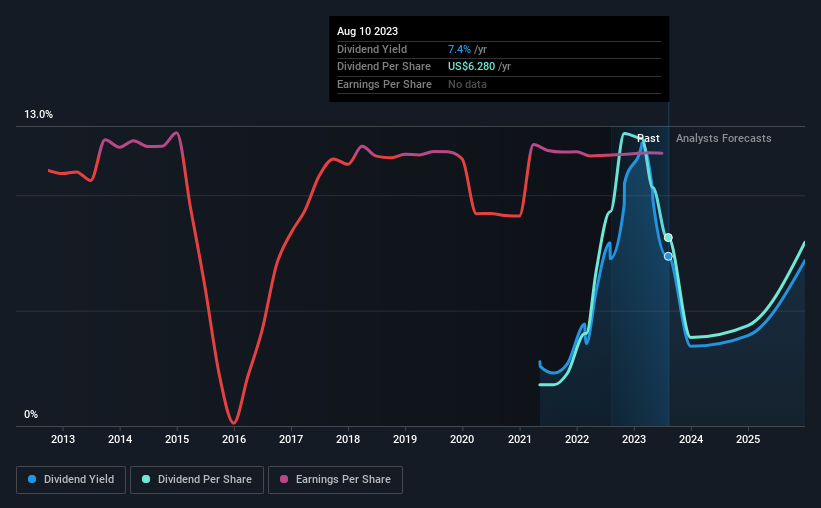Here's What We Like About Chesapeake Energy's (NASDAQ:CHK) Upcoming Dividend
Chesapeake Energy Corporation (NASDAQ:CHK) stock is about to trade ex-dividend in 4 days. The ex-dividend date is one business day before a company's record date, which is the date on which the company determines which shareholders are entitled to receive a dividend. The ex-dividend date is an important date to be aware of as any purchase of the stock made on or after this date might mean a late settlement that doesn't show on the record date. Thus, you can purchase Chesapeake Energy's shares before the 16th of August in order to receive the dividend, which the company will pay on the 6th of September.
The company's next dividend payment will be US$0.57 per share, and in the last 12 months, the company paid a total of US$6.28 per share. Last year's total dividend payments show that Chesapeake Energy has a trailing yield of 7.4% on the current share price of $85.42. We love seeing companies pay a dividend, but it's also important to be sure that laying the golden eggs isn't going to kill our golden goose! We need to see whether the dividend is covered by earnings and if it's growing.
See our latest analysis for Chesapeake Energy
Dividends are typically paid from company earnings. If a company pays more in dividends than it earned in profit, then the dividend could be unsustainable. Chesapeake Energy has a low and conservative payout ratio of just 17% of its income after tax. A useful secondary check can be to evaluate whether Chesapeake Energy generated enough free cash flow to afford its dividend. It paid out 5.0% of its free cash flow as dividends last year, which is conservatively low.
It's encouraging to see that the dividend is covered by both profit and cash flow. This generally suggests the dividend is sustainable, as long as earnings don't drop precipitously.
Click here to see the company's payout ratio, plus analyst estimates of its future dividends.
Have Earnings And Dividends Been Growing?
Companies with consistently growing earnings per share generally make the best dividend stocks, as they usually find it easier to grow dividends per share. If earnings decline and the company is forced to cut its dividend, investors could watch the value of their investment go up in smoke. For this reason, we're glad to see Chesapeake Energy's earnings per share have risen 17% per annum over the last five years. Earnings per share have been growing rapidly and the company is retaining a majority of its earnings within the business. Fast-growing businesses that are reinvesting heavily are enticing from a dividend perspective, especially since they can often increase the payout ratio later.
The main way most investors will assess a company's dividend prospects is by checking the historical rate of dividend growth. In the last two years, Chesapeake Energy has lifted its dividend by approximately 114% a year on average. It's great to see earnings per share growing rapidly over several years, and dividends per share growing right along with it.
To Sum It Up
Should investors buy Chesapeake Energy for the upcoming dividend? Chesapeake Energy has grown its earnings per share while simultaneously reinvesting in the business. Unfortunately it's cut the dividend at least once in the past two years, but the conservative payout ratio makes the current dividend look sustainable. Overall we think this is an attractive combination and worthy of further research.
In light of that, while Chesapeake Energy has an appealing dividend, it's worth knowing the risks involved with this stock. Be aware that Chesapeake Energy is showing 4 warning signs in our investment analysis, and 2 of those are potentially serious...
A common investing mistake is buying the first interesting stock you see. Here you can find a full list of high-yield dividend stocks.
Have feedback on this article? Concerned about the content? Get in touch with us directly. Alternatively, email editorial-team (at) simplywallst.com.
This article by Simply Wall St is general in nature. We provide commentary based on historical data and analyst forecasts only using an unbiased methodology and our articles are not intended to be financial advice. It does not constitute a recommendation to buy or sell any stock, and does not take account of your objectives, or your financial situation. We aim to bring you long-term focused analysis driven by fundamental data. Note that our analysis may not factor in the latest price-sensitive company announcements or qualitative material. Simply Wall St has no position in any stocks mentioned.

